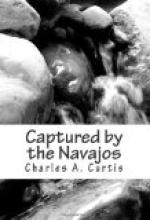After leaving Zuni, a march of thirty-two miles brought us late in the evening to a spring variously called by Mexicans, Indians, and Americans, Ojo Rodondo, Wah-nuk-ai-tin-ai-z, and Jacob’s Well. It is a funnel-shaped hole in a level plain, six hundred feet in diameter at the top, and one hundred and sixty feet deep.
At the bottom of the hole is a pool of brackish, green water, reached by a spiral track around the wall. Our cooks first procured a supply of water, and then the animals were driven down in detachments. They waded, swam, and rolled in the water until it was defiled for human use.
An hour after our arrival four Navajos appeared and were admitted to an interview with Captain Bayard, of whom they asked information concerning the terms offered their bands as an inducement to surrender and go upon the reservation. In reply to our questions they told us we would find plenty of water at Navajo Springs, seven miles from Jacob’s Well, and that there had been a heavy rainfall at the west. As the Indians were preparing to leave, Corporal Henry came forward and asked Captain Bayard to inquire for Manuel Perea. The captain thanked the boy for the suggestion, and did so; and we learned that a Mexican boy, answering the description given, was assisting in herding the ponies of Elarnagan, north of the Twin Buttes, at the head of Carizo Creek.
“Carizo Creek,” said Frank, reflectively, turning over his schedule of distances, “that is 19.05 miles from here.”
[Illustration: “CORPORAL HENRY ASKED CAPTAIN BAYARD TO INQUIRE FOR MANUEL PEREA”]
“Yes, and there are the Twin Buttes,” said Henry, pointing to two prominent peaks to the northwest. “Can’t we go there, sir? It cannot be more than thirty miles.”
“I would not be justified in leaving the road except upon an extraordinary emergency,” replied Captain Bayard.
“Don’t you suppose, sir, that Elarnagan would give Manuel up for the large reward his mother offers?” asked Brenda Arnold, who stood by the side of the boy corporals, an interested listener to all that had been said.
The captain asked her question of the Indians, and one of them replied that the chief had refused large offers heretofore, and would doubtless continue to do so.
“Cannot you scare him by a threat?” asked Henry.
“I will try it, corporal,” answered the captain. Then, turning to the Navajos, he continued: “Tell the chief, Elarnagan, that it is not the part of a brave warrior to cause grief and sorrow to women and children; tell him that the great chief at Santa Fe is fast bringing this war to a close, and that two-thirds of his people are already on the reservation at Bosque Rodondo; tell him that when he surrenders—which will not be long from now—if the boy Manuel is not brought in safe he will be severely punished.”
“Thank you,” said Henry.
The Indians left in a northerly direction.




